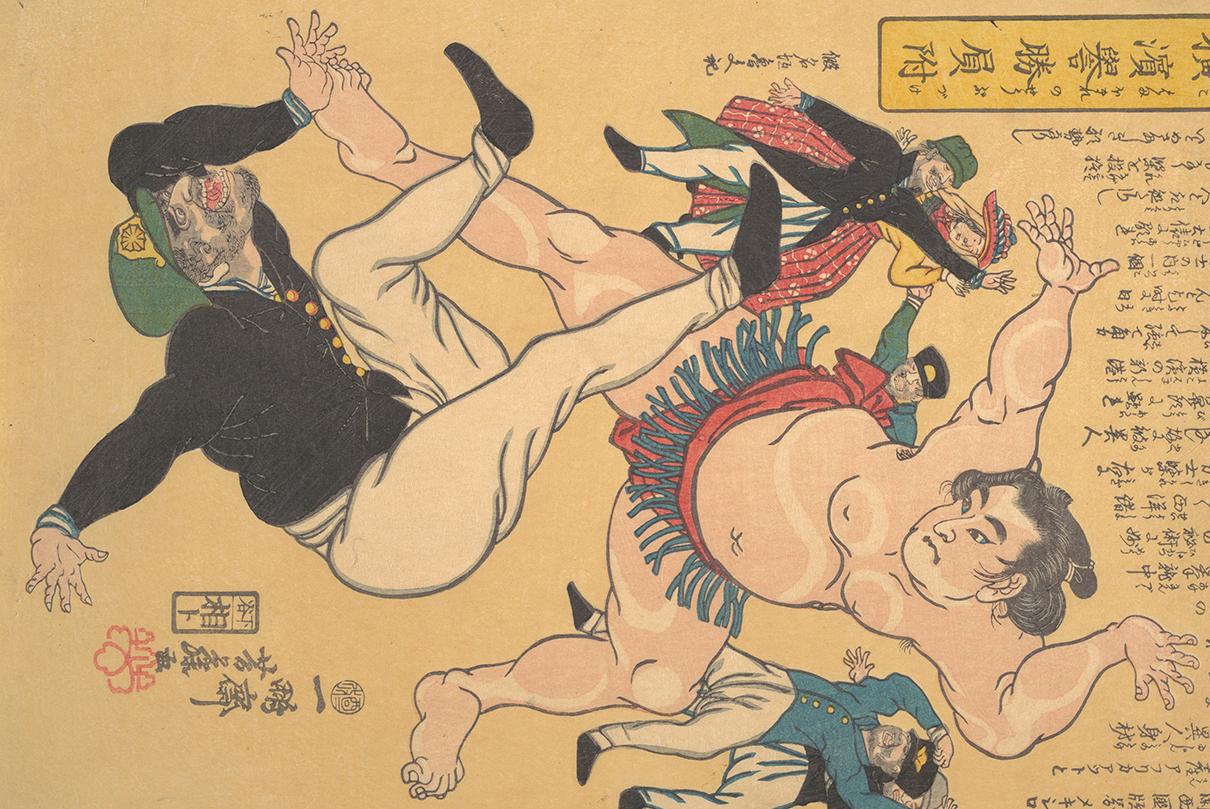On July 8, 1853, Commodore Matthew Perry sailed his squadron of four U.S. Navy warships into Edo Bay. The Japanese, still clinging to their centuries-old policy of total isolation from the rest of the world, were not completely in the dark about the growing power and assertiveness of the Western barbarians. Signs had been identified, studies had been ordered, some preparations had already been made. But the “ships of evil mien,” billowing black smoke without a single white sail in sight, would in short order plunge Japan’s ancien regime into one of the most dramatic and far-reaching social and political upheavals that the world has ever seen.
There are, during times like these, a few reasons to reflect on this odd bit of history, as one-half of America—and the West more generally—celebrates the decisive restoration of the old order under the new president, Joe Biden. In 2016, Donald Trump was, in some ways, a black ship on his own; a president of evil mien in the eyes of the shocked, chattering classes. True to historical example, the progressive managerial class, the career civil servants, and the august captains of (offshore) industry—which he rhetorically placed himself in opposition to—were far from ignorant. Signs had been identified, studies ordered, and New York Times think pieces about ailing coal communities and deaths of despair in the hollowed-out America outside urban metropoles had been dutifully penned and greeted with oohs and ahhs. But these half-hearted preparations could not stop the populist ship from entering the harbor.
In the wake of Trump’s election, Brexit, and the growth of anti-EU populism, the placid doctrines of establishment politics are now being remade. But perhaps more significant is the absolute and utter collapse of Western self-declared “anti-establishment” politics: the “socialist” left has proven to be one of the earliest casualties. The cresting wave of left-wing populism turned out to be illusionary; as it receded, its only lasting legacy was bitter acrimony, rotting political hopes, failed analyses, and stranded careers in academia and the NGO-world.
This is not to say that “the left” has lost. Only the romantic narodism of the 21st century left has truly died: the belief that “the people,” or “the working class,” can be relied upon in the political struggle. One need only consider the riots going on even now in the US, or the one of the many institutional revolutions playing out (at foundations, newspaper editorial boards, and academia), to recognize that the movement is still in good health. But after the disappointments of late-2019 and mid-2020, those revolutions will no longer maintain any pretense of being waged by the people. They won’t even pretend to be waged for them.
The situation on the right is equally broken and chaotic. Every victory—Brexit, the 2019 UK election, the surprising triumph of Trump in 2016—has only further discombobulated their old coalitions, hastening the process by which the right (at least as it has been constituted in the post-war era) continues to fall apart. No side, it seems, can escape the looming shadow of those black ships.
In any event, the very concepts of “victory” and “defeat” today are abstract and nebulous. In the UK, the Tories crushed Labour’s red wall in a stunning win that probably outpaced even the most optimistic scenarios of the party’s own strategic planners. Yet one gets the sense that nobody is quite sure what it all actually means. In a way, the Tories are as sheepish about having won over large segments of the working-class demographic as the Labour Party is about having suddenly lost them. The world has moved well past our old ideas about it, and today those ideas huff and puff mightily as they struggle to catch up with events.
To understand the failures and contradictions inherent both within the now-dead project of left populism and the extant but visibly-contradictory project of populisms both from the right (whether European or American) and from new entrants to the political field (such as the Italian M5S movement), one ought to give serious consideration to a phenomena that has not been seriously interrogated: that the death of George Floyd in the United States would kick off large protests, even riots, in capitals across Europe, and that the victory of Joe Biden would be greeted with tears of joy, by, say, a social worker in a mid-sized municipality in Sweden.
This feature of the contemporary Western world is usually explained away as a result of American cultural and/or ideological hegemony. But a millennial growing up in Europe twenty years ago was already watching American sitcoms, eating McDonalds, and playing video games that glorified American participation in World War II. American cultural or ideological “imperialism” is hardly an invention of the Trump cabinet, and yet the sort of extreme identification between the politics of American hub cities (to borrow a term from Michael Lind) and its equivalent hub cities in Europe is fairly new.
Yet, it is only just now that we are seeing, with clear eyes, that this class of people might begin acting as a class.
The left may prefer to talk about a supposed “precarization,” of the college educated, and the right may be more comfortable talking about ”useless college degrees,” but neither side denies the facts on the ground: that for some time now, the West has been using a massive expansion of higher education to create a new class of functionaries—”knowledge-workers” and would-be managers—in numbers far in excess of what the labor market can or could absorb. Yet, it is only just now that we are seeing, with clear eyes, that this class of people (which, again, nobody denies the existence of) might begin acting as a class.
One could argue we’ve been here before. During the Springtime of Nations that swept Europe in 1848, the students of Vienna were enduring their own “lost decade,” and were consequently far more militant and revolutionary than the workers they presumed to speak for. To be a student in Vienna back then usually meant graduating into a job with the imperial bureaucracy. But the job market for that line of work had been dismal for some time, owing to years of strained financials within the Austrian empire. Of course, the speed by which revolution spread through Europe in 1848 couldn’t be due to “French cultural imperialism” alone. New ideas about constitutionalism and national liberation spread most rapidly in places where conditions were just right (Germany, Italy, Hungary, etc), and fizzled out in places where they weren’t (the United States, Great Britain).
Rather than try to pin the blame on American television, or even social media, it behooves us to recognize that the conditions for this new “Springtime of the Managers” are just as ripe in London and Berlin as they are in Portland and New York City. What we have now on the left and right—on both sides of the Atlantic—is an open and bitter class war. It is a conflict between a growing cadre of imperial lords and the peasantry they hope to subjugate; between the managers and petty nobility of the much-prophesied “knowledge economy” and those they aim to manage.
Just as few took the existence of this class of people seriously, no one took the existence of this class war seriously until recently. The left was forced to outright deny it because they were already on the side against the working classes, and any acknowledgment of that fact would destroy their legitimacy. What is East Germany, without Communism? Nothing; it is merely part of greater Germany. The left faced a similar dilemma, and so the charade, emptied of all class conflicts in favor of “cultural” ones, had to be maintained.
Meanwhile, a minority of left intellectuals have already begun jettisoning ideological ties to a people it no longer belonged to or recognized. In the UK, thinkers like Paul Mason diligently sought to replace workers with young (educated) people who have a smartphone as the natural constituency of the left. In the US, Nathan J. Robinson, the publisher of Current Affairs magazine, pleaded for the left to finally abandon Marxism and historical materialism in favor of couching its arguments in moral terms. These characters were, almost without exception, mocked and ridiculed. But time has vindicated them. It is now clear that they took heat not because they suggested a new and different strategy, but because they were advancing the end to the left’s doublespeak and doublethink. The left had long since abandoned the workers; Mason and Robinson were merely preparing the ideological contingency plan for when the workers would abandon the left, as has now well and truly happened.
In the leadup to the 2020 election, the right faced a different dilemma. For them, the class conflict they refused to recognize was internal. The Democrats, having fully consolidated its new political coalition between petty managers, Silicon Valley grandees, and a dwindling base of minority clients, could not only defeat the likes of Bernie Sanders, but also reabsorb all of the hammer and sickle-brandishing “revolutionary communists” back into the machine. Unfortunately for the GOP—as with the Tories in Britain and the Sweden Democrats or Rassemblent Nationale in Europe—the consolidation of “the ascendant” into center-left parties has left them stuck with the political leftovers: an entirely ad-hoc coalition consisting of disgruntled heartland workers, small business owners, and big business also-rans. For this reason, and in part due to the intellectual legacy of the Cold War, talk of actual class conflict comes at a very high risk for the right. Trying to unite the competing interests that make up the extant and potential base of the Republican party is nigh impossible. The Democrats—and the Western left in general—talk about culture rather than political economy because they know the makeup of their coalition, who their enemies are, and what their plan is. Republicans—and the Western right in general—talk about culture rather than politics because they know none of these things.
We understand now that the pussy-hat protests were only the beginning, followed by the rolling media campaigns, strife and resistance from parts of the state apparatus, and the mobilizing of not just an entire cadre of journalists, but of the very infrastructure of social media and information technology as such. Russiagate came and went with nary a motion by social media companies towards flagging its outlandish theories. Then came the Black Lives Matter protests, and the scenes of real political violence in the streets, coupled with an open effort to paper over its adverse effects. If women stepping out of yoga class to protest the fascist cheeto in the White House was funny, medical professionals concluding that protests against “white supremacy” were less problematic in terms of spreading COVID-19 than right-wing protests against lockdowns should be recognized as an expression of class power. That class power was again publicly exercised during the election, when social media suddenly did find it within themselves to intervene in the political discussions of its users.
Supersize the State
As a political cause, Black Lives Matter seems to thrive just as well among the surplus managers of Dublin as it does in San Francisco—never mind the complete incompatibility of the Irish situation with the American. Sweden, for example, never had a plantation economy nor a period of formal or informal Jim Crow rule. But this in no way impacted the formation of a Black Panther movement in immigrant-dominated suburbs. At first blush, the children of immigrants to Sweden—predominantly of Middle-Eastern descent—cosplaying as 60s-era Afro-American freedom fighters reads as a hilarious anachronism. But there is an institutional logic behind it: Sweden already has a state-funded patronage network geared towards “community organizers” in particular, but also the surplus professional class in general.
Behind most declarations of proletarian solidarity or racial justice, one tends to find repeated and urgent demands for the state to simply create more jobs. How do we solve the thorny issues of racial justice? By diverting more federal and state money to employing the various temporarily embarrassed aspiring commissars currently stocking the shelves at Target, of course! While the language of economic redistribution today maintains a veneer of proletarian radicalism (often eagerly assisted by various red-baiters on the right, as seen during the fairly anemic “Joe Biden will usher in SOCIALISM” run-up to the 2020 election), only the truly credulous could believe that demands for the state to directly and indirectly employ more and more college graduates—creating as many ideological commissariats as necessary to rescue them from the ignominy of having to work at Starbucks—merely represents some innocuous side effect of the political project as a whole.
A full accounting of the scope of the Swedish patronage machine is neither possible nor necessary in this essay, but it does serve as a valuable example. Most of the country’s patronage machine actually predates the class that currently subsists on it. The “one percent rule” which states that at least one percent of the budget allotted to new buildings or infrastructure must be paid to artists for the express purpose of creating art, is just one example. The Swedish Inheritance Fund, (Allmänna Arvsfonden) was established as far back as 1928, when the country abolished the automatic inheritance rights of cousins and other distant relatives in the absence of a written will or close family. Originally, the intention was that the state would use this newly “orphaned” money to fund the care of orphanages and related causes. The fund’s mission has expanded over time to the point where it now funds a great variety of overtly ideological causes—often with next to no oversight. As such, the fund has become controversial, especially in the eyes of the Swedish right.
The various incarnations of the “one percent rule” or the Inheritance Fund only scratch at the surface. On every level—state, regional, and municipal—myriad grants, privileges, subsidies and direct cash transfers are available, aimed at a heterogenous group of race hustlers, artists, activists, and academics. It hardly needs to be said that cultural minority status, or fluency in the shifting language of wokeness, is a strict and unavoidable requirement for those seeking to access these resources. The state also pays the salaries of many Swedish journalists, either directly (through the various public service channels) or indirectly, through massive distribution subsidies. Are you perchance a radical syndicalist on a holy quest to crush the capitalist value-form while also grinding the running dogs staffing the reactionary Swedish state into dust? Have no fear, that state will gladly subsidize both your salary and cost of distribution for your newspaper urging the workers to destroy capitalism! Even as larger and larger parts of Sweden succumb to deindustrialization and lack of opportunity, this money tap will keep flowing.
All of this is to say that there is a very real, non-ideological endpoint for many of the fervent demands coming from the Red Guards of the American cultural revolution. The state can take it upon itself to create and sustain an ever increasing number of jobs for the surplus elite generated by our universities. Moreover, even systems that were originally not intended to serve as patronage machines for surplus managers—such as a state fund for orphans—can easily be repurposed into a job creation program controlled by woke guild rules. Again, to reiterate: very few of our institutions that are now notorious as liberal-hegemonic patronage machines were created for that purpose; they were colonized. American conservatives should thus be very careful in their quips about “socialist Sweden,” given their own immediate future.
The Class War in Full View
The left populist project is very much a project of social democracy for young professionals. Joe Biden’s electoral victory—such as it is—would have been impossible without the immense class solidarity and sense of purpose uniting the supposedly “ascendant” or “reality-based” half of America. (Drunk on victory, there is already talk of drawing up lists of people who in any way abetted the old regime.) They no longer feel any need to hide their power, or their plans for the future.
Broadly speaking, these surplus managers have two complementary goals: the above-discussed expansion of the social-democratic state, and the establishment of formal and informal guild protections and structures within the newly-expanded or pre-existing professional fields they hope to inhabit. Some characterize this secondary goal as one of ideological domination of the workplace, but this confuses the means with the ends. Put plainly, the ideas that are getting people fired today are not only empty of content, they are also constantly and arbitrarily changing. Compared to the often murderous totalitarianism of, say, a crusading religious fanatic, there is a distinct lack of object permanence at play here. The religious fanatic, obsessed with forcing everyone to bend to the True Faith, chooses his doctrine once and then sticks to it. But in the world of the woke, doctrine is ever-changing, and the commissars of today will gleefully sign your proscription sentence for holding opinions they themselves held only yesterday.
The point of this “totalitarianism” is not to force everyone to think correct thoughts at the risk of getting fired; it is to get them fired.
Yet, in this cultural revolution, the fickleness of its dominant ideas is an essential feature, not a bug. The point of this “totalitarianism” is not to force everyone to think correct thoughts at the risk of getting fired; it is to get them fired. Full stop. Like the medieval guilds of old Europe, surplus managers are threatened by the existence of a mass of people willing to do any job within their ambit that cannot be comfortably accommodated without inviting the pauperization of their entire profession. For the medieval guilds, guaranteeing that only a select few who could actually hope to become carpenters or glove makers had nothing to do with improving the economic efficiency of the towns, but rather to secure the living standards and social status of those carpenters and glove makers already in practice.
Guilds, unlike unions, are institutions meant to inflate scarcity. It is hard to imagine an American auto workers union threatening strike action in order to forestall Ford or GM from producing more cars. After all, more cars means more workers, means more potential union members, means more power for the union. The specific political opinions of any one worker does not factor into the basic arithmetic. For a guild, however, the arithmetic of power is very much concerned with the ability to discipline its own members, as well as raise barriers of entry into the workplace via social, cultural, or other grounds. For the union, having more members is (almost) always just a good thing. For the guild, it is a nightmare scenario. (Of course, exceptions exist. In some narrow vocations, unions maintain scarcity through licensing requirements and other means. But even then, the interests at play are economic, managing qualified labor scarcity for the benefit of its members.)
It is significant that the figure of “the boss” is imagined by these surplus managers as being evil not because he is a capitalist, but because his myopic profit motive or outdated personal morality is an obstruction to the creation of committees staffed by employees for the purpose of firing and disciplining other employees. Today, one can even be a millionaire capitalist while maintaining a properly anti-capitalist, revolutionary outlook, denouncing other companies that refuse to discipline their workers for ideological commitments.
In the end, the scenes of affluent white liberal women loudly denouncing black police officers as uneducated, primitive stooges speak less to the ideological incoherence of our political moment so much as it does the increasing solidity and robustness of the guild structures that are now colonizing America. This is no war of ideas that conservatives are somehow losing on college campuses across the country; it is a war of structure and position. No new arguments, no witty retorts, and no debate club skills will shift the frontlines even an inch.
To illustrate the hopelessness of any conservative or right-wing project which aims to somehow “shift the debate,” consider the way those same efforts played out on the left before the election. Take the case of Jacobin magazine’s recent article entitled, “Trying to Get Workers Fired Is the Wrong Way to Fight Racism.” Within minutes of its being published to Twitter, the article was inundated with angry and shocked reactions from mostly self-identifying socialists. The idea that bosses shouldn’t be trusted with the power to arbitrarily dismiss workers over allegations of racism produced a firestorm of controversy among the people who, we are supposed to believe, represent the vanguard that will lead those same workers into a revolution against those same bosses.
If this is just a modern expression of “Marxism,” then it has certainly come a long way.
Black Smoke Against the Sunset
It is here, finally, that we return to the kurofune of the West, one Donald J. Trump. Sailing into 1600 Pennsylvania Avenue, he could hardly have predicted the massive centrifugal forces he would unleash. But the point of this comparison is not to give historical flavor to the political system we’ve endured over the last four years. Rather, it is to give an idea of what comes next.
Just as the Boston Tea Party looms large in the minds of Americans, the entrance of the black ships into Edo bay occupies a place of importance in the Japanese historical memory. It is seen as the moment in which the simmering social and political contradictions irrevocably boiled over. Neither the British monarchy nor the Japanese shogunate recognized what was happening until well after the point of no return. The fight against Trump has already forced such massive changes that the old social compact no longer exists. Silicon Valley has merged with the larger progressive machine, taking it upon themselves to guide (if not outright control) political discourse, picking political winners in a completely open and blatant manner.
The old order that was constituted in the US in the 90s depended on the separation not of church and state, but of the separation of civil servants, technical expertise, and scientific empiricism from politics. Without it, end-of-history liberalism lacks any legitimating mechanism. But it is precisely this separation that has just been destroyed; often violently and publicly. The election—with its artfully coordinated media blitz, the monumental failure of institutional polling (again), and the sudden about-face on the existence of electoral interference, is just the final swing of the knife against what remains of post-war Western liberalism.
This is not some trifling ideological point. The last year has seen very large institutional changes in the real world—huge cash transfers from business to various progressive NGOs, the embrace of political education in government institutions as a matter of course (briefly and ultimately meekly resisted by Trump’s executive order, now poised to return stronger than ever). On top of that, the US has seen a series of rolling purges of politically unreliable people from all positions of importance within academia, journalism, and similar sectors. Are those people going to suddenly be rehired now that Trump is gone, no harm, no foul? Will the alliances forged between progressive liberal causes and big business be voided, and all that money returned?
Even so, it is very much in doubt that many people actually want to go back. All these new alliances, all of these new technical and social instruments of political control and discipline, are far too useful for anyone to willingly give up. You can hear it clearly coming from congresswoman Alexandra Ocasia-Cortez: the tune for the future seems to be a mix of revenge and reeducation, not restoration. But since the deplorables are unlikely to whip themselves in penance, the reeducators will have to be trained, deployed, and (one would assume) amply paid for their work.
The class war is here. It will not go away on its own. After 2020, not even the staunchest anti-communist or “traditional conservative” on the right should indulge fantasies to the contrary. Donald Trump, whatever else one may say of him, was not defeated by ideas, but by a society-spanning managerial omerta, organized by a stunningly impressive (and frankly, terrifying) class alliance working together in total discipline.
In an era of elite overproduction, the only realistic means of sustaining the unsustainable elite’s social status and standard of living is by increasing the exploitation of the rest of the population; demands, taxes, and tithes levied against the two-thirds of America that does not attend college by the one-third that does. And so more institutions will be built, more money will be transferred from the undeserving poor to their educated superiors. Our media personalities, academics, and experts will continue the work of inventing new crimes for their gardeners, gig workers, and unemployed countrymen to commit, so that they might maintain this process of looting and extortion.
Those of us outside this coalition of the ascendant—whatever else we may lack in commonality—are now called upon to realize one very basic point: regardless of whether you call yourself a national conservative, a one-nation Tory, a part of Blue Labour, or a labor populist, this class war cannot only be analyzed and complained about. It must be vigorously prosecuted and won. It is one thing to debunk the “Marxism” of the surplus managers, but another thing entirely to strike against the structures of their guild privilege, dismantle their networks of patronage and access, and defund and marginalize their institutions and money pipelines.
The battle lines of the class war have been drawn. For those of us who would fight against this miserable vision of the future, it is high time we proclaimed our own Sonnō jōi. Only then can we hope to restore some semblance of dignity. Only then can we hope to halt the creeping rot that is eating us from within.
Forth, then, ye heroes, patriots and lovers!Comrades of danger, poverty and scorn!Mighty in faith of Freedom, thy great Mother!Giants refreshed in Joy’s new rising morn!Come and swell the song,Silent now so long;England is risen, and the day is here!









